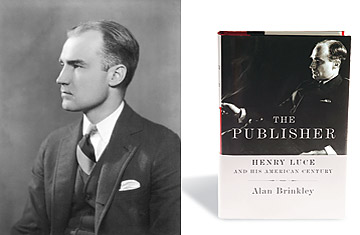
Henry Luce, co-founder of TIME and long the head of Time Inc., was an unlikely revolutionary. He was the son of a Presbyterian missionary in China, a product of élite boarding schools, a Skull and Bonesman at Yale, an ardent Republican throughout most of his life. He became one of the wealthiest men in the U.S., and he lived accordingly. He disliked most of the New Deal and loathed Franklin Roosevelt. His famous 1941 essay in LIFE, "The American Century," was a call to reshape the world on the American model. He was a passionate champion of the U.S.'s unpopular wars in Korea and Vietnam.
What made Luce a revolutionary figure in American life was not his politics or his religion or his missionary zeal. It was his success in creating a new era of communications that had an enormous impact on the culture of the 20th century. At the precocious age of 24, Luce and his brilliant classmate, friend, partner and rival Briton Hadden created the first newsmagazine (a word they invented). TIME was truly something new — a concise summary of the news of the world, published weekly and marketed throughout the U.S. and later around the world. It was not to everyone's taste, with its deliberately idiosyncratic language and its sometimes arch opinions. But for its hundreds of thousands, and eventually millions, of readers, TIME was among the first publications to make the news of the world available to them. TIME became a kind of glue, providing professionals and other (mostly middle-class) people with a common, reliable and concise guide to the type of information that was now more important to them than ever before. In Sinclair Lewis' 1922 novel Babbitt, the title character speaks triumphantly of the "sane standardization of stores, offices, streets, hotels, and newspapers throughout the United States." To Lewis this standardization was a mark of society's arid consumerism, but to most middle-class Americans, such changes represented progress; to Luce they became the process by which a market for a national newsmagazine could be created.
Hadden died prematurely, in 1929, a few days after his 31st birthday. Luce moved forward with his own vision without looking back. In 1930, during the early months of the Great Depression, he launched the first truly serious business magazine — FORTUNE, a dazzlingly beautiful monthly designed to examine business and capitalism in a way that would provide knowledge about the economy that he believed most Americans, not just businessmen, should have. FORTUNE was a lively, literate, serious and pathbreaking magazine in a field that had previously been largely celebratory. Six years later, Luce produced the first issue of LIFE, perhaps the most popular magazine ever published in the U.S. In the new age of photography, it was not the first "picture magazine." But LIFE was by far the most creative and successful, offering a visual representation of its time and revealing, as Luce wrote in his famous prospectus, "the faces of the poor and the gestures of the proud ... strange things — machines, armies, multitudes, shadows in the jungle and on the moon ... things hidden behind walls and within rooms; things dangerous to come to."
Luce launched other innovations, like The March of Time, the first newsreel to offer documentary features, which won an Academy Award. There was a weekly national radio program drawn from TIME. And in 1954, the first serious sports magazine — SPORTS ILLUSTRATED — began publishing. Like FORTUNE, it relied on good writers (among them William Faulkner, A.J. Liebling, Wallace Stegner, Budd Schulberg and John Steinbeck). Luce insisted that it should elevate the world of sports from being "just a game" to a metaphor for the human condition. The Time Inc. publications were extraordinarily expensive to publish, but he believed that spending more money for greater quality was the best strategy for success. As one of his associates put it, Luce and his team moved ahead in "an atmosphere of complete and serene confidence" to grasp "the chance of a lifetime."
